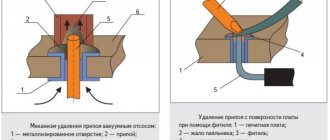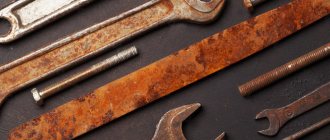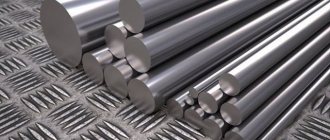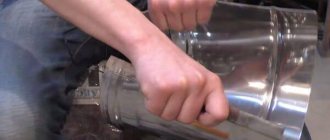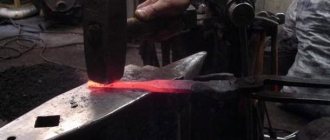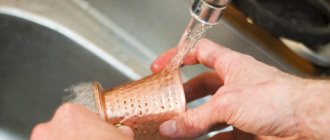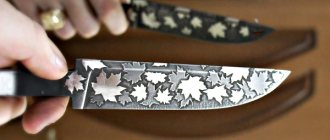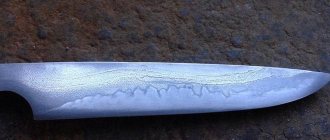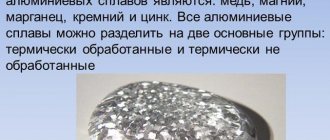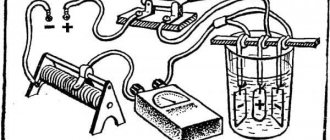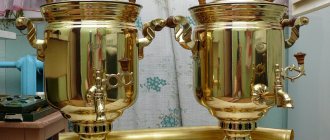Metal oxidation occurs when exposed to moisture and oxygen. As a result, a reddish-brown coating forms, which over time destroys the material.
To eliminate corrosion, not only purchased products can be used, but also simple home recipes.
Read the article about how to remove rust from metal at home using folk remedies.
How to clean aluminum from oxidation at home
The following methods are designed to eliminate blackening, greening and oxidation.
Pass a third of a bar of household soap through a grater and combine with 500 ml. hot water. Dip the artifacts into the solution and time it for a quarter of an hour. After a specified period of time, the plaque will peel off; all that remains is to completely rinse the coins with a sponge.
No. 2. Lemon
Drill the citrus in half. Insert the products directly into the soft part and wait a third of an hour. Then remove, scrub with a toothbrush, rinse and dry.
No. 3. Vinegar
Protect your skin with gloves. Start clearing the coins one by one. Place each of them in your palm, pour vinegar over them and rub with your fingers. Finally, don’t forget to rinse your items. As a second option, you can take ammonia.
No. 4. Salt/soda
Since there is a simple way to clean coins from rust and oxidation, we recommend using it. At home, everyone has soda or salt. Measure out 2 tbsp. l., combine with 200 ml. hot water. Soak the artifacts in the solution, after half an hour, rub and rinse.
No. 5. "Coca Cola"
Cleaning is carried out similarly to the previous method. It is enough to immerse the artifacts in soda for 20-25 minutes. After a specified period of time, clean with a sponge and do not forget to rinse the coins.
You can remove severe rust with a solution of lemon juice. At 0.4 l. water is about 20 grams. acids. After the granules have dissolved, place the coins inside and time a third of an hour. Wipe with a sponge and rinse.
Cleaning methods depend on the sample and the extent of the damage, so proceed according to the situation.
1. If the silver is old and of the highest standard, then the blackness can be removed with ammonia. Mix it with water in a ratio of 1 to 10, soak the products for an hour.
2. If there is no alcohol, use soda (per 150 grams there is 0.5 liters of water). Immerse the coins in the warm mixture for 3 hours.
3. You can also clean it with ammonia, tooth powder/paste and soda. Combine the components in equal proportions. Apply to coins and use a brush. After all actions, rinse and dry.
4. If the exhibits are of low standard, then you will have to arm yourself with a special type of salt called “Trilon B”. Measure out 20 g, mix with 0.25 l. warm water and send the coins inside. Cleaning is carried out after the plaque has peeled off.
Important!
Since coins can be cleaned with special means that remove not only rust and oxidation, but also blackness, we advise you to buy the product and use it at home. The product is selected taking into account the silver standard.
Before cleaning coins from rust and oxidation, it is worth mentioning that each alloy needs individual cleaning. Before carrying out the procedure at home, it is important to evaluate the quality of the metal.
1. Often one side of the coin needs to be cleaned with an anti-corrosion compound; the reverse side may not be damaged. Therefore, during classical cleaning with acidic compounds, pure metal can deteriorate. Fading and discoloration appear.
2. Therefore, cleaning such coins at home does not guarantee the desired result, but improving the appearance of the metal can still be achieved. To do this, prepare a solution of 250 ml. hot water and 50 gr. table soda.
3. Place a coin in the composition for a third of an hour. The metal should not come into contact with anything. Next, take out the product and start brushing with toothpaste without any additives. Tooth powder will do.
4. When using the powder, manipulations should be carried out with extreme caution. Small particles often leave micro-scratches. If after the procedure you are not satisfied with the result, use a different chemical composition.
5. Purchase a special product to remove corrosion and plaque. Spread the gel over the surface and start rubbing with a soft cloth. If stains cannot be removed, use a coarse brush instead of a rag. If the procedure is carried out correctly, the metal will shine.
How to clean zinc coins not only from rust and oxidation, but also from other deposits? The process is quite labor intensive. Therefore, at home you will have to work with hydrochloric acid.
1. Please note that it is strongly not recommended to leave the product unattended in such a liquid. Literally every few seconds you need to check the condition of the coin. You will see the patina come off. Next, the acid will take on the metal.
2. To make the procedure as effective as possible, arm yourself with a wide container. This is necessary so that you can keep the product in the solution and at the same time clean it with a brush. You will need a 1% hydrochloric acid solution. The composition does not harm human skin.
3. Once you have completed all the steps, rinse the metal with running water under strong pressure. This will get rid of any remaining acid. Remember that the procedure is labor-intensive, but the end result will please you.
Cleaning antiques is a labor-intensive task. If you find a decent example and can restore it, you can make some good money at auction. In any case, try it and do not forget that each metal needs an individual approach.
Questions about how and how to clean aluminum are relevant for many.
Aluminum products are distinguished by their lightness, convenience and beautiful shine, but as a result of use they quickly darken, become covered with plaque or oxide, which spoils the aesthetic appearance and interferes with the full use of the item.
To restore the shine and purity of aluminum, use folk remedies and special household chemicals, follow the recommendations for care and use.
Aluminum is used to make dishes, automobile parts, furniture elements, etc. It is resistant to rust, but is susceptible to carbon deposits, limescale, darkening and oxidation
General recommendations
Aluminum is a soft metal that requires careful handling during operation and cleaning. To clean products from various types of contaminants and not damage the material, follow simple recommendations:
- Do not use metal scrapers or brushes, hard scourers or sharp objects. These tools damage the surface, leaving scratches and other unsightly marks. After such treatment of the dishes, aluminum particles can get into the food, which will negatively affect the taste of the dish and its benefits.
- Do not clean aluminum alloy products with abrasive agents (sand, powder).
- Kitchen utensils should only be washed after they have cooled down. Hot metal deforms when interacting with water, and it is almost impossible to return its original appearance on your own.
- Do not use aggressive substances such as acids or alkalis for cleaning. They spoil the aesthetic appearance, and the resulting chemical reaction can lead to the release of toxins or heavy metals that are hazardous to health.
- To achieve the desired effect, choose a cleaning method and cleaning product based on the type and degree of contamination.
- Do not wash aluminum cookware in the dishwasher. Temperature changes negatively affect the metal and increase the risk of deformation and corrosion.
- To make the product shiny, polish the surface with a sponge dipped in a solution made from borax and ammonia in a 3:1 ratio.
Aluminum products require a special approach to cleaning and operation to avoid deformation, scratches and irreversible damage. Do not wash aluminum cookware in the dishwasher.
Aluminum is susceptible to oxidation. As the product is used, the oxide layer grows, which leads to the appearance of dark spots that cover the entire surface or individual parts.
You can clean oxide and blackness at home using available folk remedies:
- Soda. Dissolve the product in a small amount of water to obtain a paste. Apply the mixture to the stain and work the surface in a circular motion.
- "Coca Cola". Fill the item with soda and after 1.5 hours wash it with water.
- Sorrel. Place a bunch of fresh sorrel in a container that needs cleaning and fill it with water. Place the dishes on the stove and boil the mixture over low heat for 30 minutes. Drain the solution and rinse the product.
- Lemon acid. In a saucepan, combine 2 tbsp. l. citric acid and 1 liter of water. Boil the solution for 15-25 minutes, depending on the degree of contamination, and then wash the container with clean water.
- Apple. Rub the darkened, oxidized mark with half the fruit and leave for half an hour for the malic acid to take effect. After the time has passed, wash the container with detergent.
We suggest you read which iron sole is better: ceramic or titanium.
Baking soda effectively fights oxide and dark stains on aluminum surfaces. The product is suitable for local application or large-scale cleaning of large items
To remove blackness from the outer walls of the product, prepare a mixture of equal parts of table salt, vinegar and dry mustard powder. Mix the ingredients until smooth. Using a sponge, apply the mixture to the stains and after 15 minutes, rinse with warm water.
Salt
To clean aluminum, combine 2 tbsp. l. salt and 1 tsp. warm water. Mix the ingredients and apply to a sponge. Rub the mixture into the stained area, leave for half an hour, and then wash the pan.
Acids
To clean aluminum products, use products containing natural acids: kefir, lemon juice, yogurt, cucumber pickle. Fill the container or part with the selected product and leave overnight. In the morning, rinse the product and wipe dry.
Cleansers based on oxalic acid will help get rid of significant blackening. Apply the drug to the surface, wait the time indicated on the package, and then rinse with water.
Cream of tartar
You can remove dark spots using cream of tartar. To clean, dissolve 3 tbsp in 5 liters of warm water. l. product and soak the product in the resulting solution for 2-3 hours. Remove any remaining dirt with a soft sponge, rinse with warm water and wipe dry.
Darkening, dirty stains, soot and other contaminants spoil the aesthetic appearance of aluminum products. You can cope with problems at home using folk remedies or special household chemicals.
Carbon deposits are a common phenomenon for aluminum cookware. Removing the remains of burnt food and returning the product to its natural shine and cleanliness is quite difficult, given the softness and capriciousness of the metal. However, it is possible to cope with the problem using available means and small tricks.
Dentifrice
To remove carbon deposits from the bottom of the pan, sprinkle it generously with tooth powder and sprinkle with a little water. Leave the container like this overnight, and in the morning remove dirt with a silicone spatula or soft sponge.
Order galvanizing from Tochinvest Zinc
will perform re-galvanization after removing plaque on the surface.
There are 3 reasons in favor of contacting the company:
- The equipment used is from the German-Austrian company KVK KOERNER and the Czech company EKOMOR. This increases the level of galvanization.
- Compliance with technology. The process meets the requirements of GOST 9.307-89.
- Speed of work. Three galvanizing lines allow you to work even with large batches.
To get answers to your questions and order the company’s services, leave a request on the website or call.
Return to articles Share article
How to quickly remove rust from metal - a review of effective products
Let's pour some liquid over the KPE, and then use a stream of warm water to wash everything off under pressure. Engines are washed in this way perfectly. If only we could find something for aluminum.
A suitable liquid is caustic soda or potassium - alkali (not lye). Works perfectly without any jet. Everything becomes like new. White matte color. Be careful with dilution. Read about the process on the internet.
Search in railway battery services, etc.
If you can't find it in its pure form, it is found in drain cleaning fluids. It works too.
* Products made of aluminum and its alloys are etched in alkali solutions of different concentrations depending on whether their surfaces are polished (metal polishing) or unpolished: polished surfaces are etched in 1-2%, and unpolished ones are etched in a 5-10% caustic solution sodium hydroxide at a temperature of 60-70°C for 1-1.5 minutes.
The degreased part is immersed in the solution and immediately removed or wiped with a dampened swab, and after drying, wiped with a clean rag. To brighten aluminum, the oxide film is easily removed by a mixture of borax solution (50 g/l) and 25% ammonia (5 ml/l).
Aluminum products pickled in alkali are washed and illuminated for 5-10 minutes with a solution of nitric acid (concentrated) in water (30-40 and 100 parts by weight, respectively). When brightening products made of silumin - aluminum alloys with silicon (alloy AL2, AL4, AL9, VAL5) - add 1-3% hydrofluoric acid to nitric acid and treat them for 5-10 minutes.
After acid etching, the part is washed in cold and then in hot water.
Aluminum parts are etched in nitric acid only after its chemical oxidation. In electroplating, aluminum is treated in other solutions after alkali.
* To make aluminum cookware shine like new, prepare the following composition. For half a bucket - a bucket of warm water 100g. silicate glue (sold in office supplies) and 100 g of soda ash (sold in hardware stores). Bring all this to a boil and add our dishes to the composition. Boil for 20-30 minutes, then turn off and leave the dishes in the composition until cool. (At the same time, you could also put gas burners there.)
* Boiling a weak solution of baking soda in a darkened aluminum pan will give the inside of the pan a nice matte white color.
A suitable liquid is caustic soda or potassium - alkali (not lye).
If you can't find it in its pure form, it is found in drain cleaning fluids. It works too. How it works, cheap and cheerful, I used a liquid called Mole
Aluminum products are distinguished by their lightness, convenience and beautiful shine, but as a result of use they quickly darken, become covered with plaque or oxide, which spoils the aesthetic appearance and interferes with the full use of the item. To restore the shine and purity of aluminum, use folk remedies and special household chemicals, follow the recommendations for care and use.
General recommendations
Do not wash aluminum cookware in the dishwasher.
General recommendations
Aluminum is a fairly light and durable metal, and therefore is often used in the kitchen as the main material from which cookware is made. When plaque appears, it becomes unpleasant to cook in it, and it is impossible for safety reasons, and therefore the question arises of how to clean aluminum until it shines.
Heating of aluminum cookware occurs evenly and does not require much time. After some time, carbon deposits begin to appear on aluminum cookware and traces of oxide become noticeable. Most often, they try to clean aluminum using dishwashing detergent, but it can only remove external dirt and grease.
Dishes made from this material should only be washed cold, since they can easily be damaged when hot. If a hot metal is immersed in cold water, it will become deformed, and therefore you should try to avoid such a failure.
You should not try to clean burnt food immediately using iron sponges and other objects. To make the task easier, you just need to pour warm water and wait about half an hour. During this time, the food will get wet and can be removed using a regular dishwashing sponge.
It is not recommended to wash aluminum cookware in the dishwasher, since the dishwasher uses hot water during the washing process, which can damage the material. To avoid deformation, it is recommended to wash aluminum cookware by hand with warm water.
You should not use strong acids in the process, as they will not be able to restore the shine of the dishes, and may harm them. It is also not recommended to clean it with metal sponges, which leave scratches on the dishes.
The main disadvantage of aluminum is its softness. It is very easy to damage and also leave scratches on it. Even with frequent washing with a melamine sponge, the surface will soon begin to become matte, since a large number of micro-scratches will remain on it:
- To restore shine, you need to use borax, ammonia and GOI paste. The latter needs to thoroughly rub the aluminum, and then, using a rag soaked in solvent, thoroughly rub the cutlery.
- Aluminum cookware can be cleaned with such products as soap, ammonia, table vinegar and table salt.
- Soot, oxide and other contaminants that accumulate on aluminum cookware can be easily removed using soft foam sponges or polymer bristles, microfiber or cotton cloths, and rags. It is necessary to ensure that they do not contain rougher and harder materials that can leave scratches.
- A good aluminum cleaner is a special product designed for cleaning glass or porcelain. They do an excellent job, gently removing dirt and adding shine to the dishes.
We suggest you familiarize yourself with How to clean upholstered furniture at home. How to effectively clean polished furniture from various types of stains
Remove carbon deposits
Cleaning oxides and carbon deposits is also quite simple. This will require funds and products that many people have in their homes. Moreover, such cleaning does not take much time and does not require serious effort.
Aluminum is clarified using brine from cucumbers, fermented milk products such as milk and kefir. It is necessary to pour the available product into the dishes that need to be cleaned for half a day.
Most often they leave it overnight so that you can simply wash the dishes in the morning. If you need to clean some objects from carbon deposits, they can be placed at the bottom of the container that was filled. Cleansing occurs thanks to the acids found in these products.
A sour apple will help clear carbon deposits and remove oxidation. The fruit needs to be cut in half and rubbed onto the desired surface until shiny. The acid will corrode all dirt, and therefore, after rinsing with water, the item will shine.
Contaminants can be removed using a saline solution. You need to take salt and water in equal proportions, and the first ingredient should be completely dissolved. Using a sponge, you need to apply the solution to the item that requires cleaning, leave it in this state for a while, and then rinse thoroughly with water.
Cleaning aluminum objects - a flask, dishes, coins - is quite simple if you know the easiest methods to do it. It is recommended to use traditional methods rather than standard dishwashing detergents, which will not cope with heavy stains.
Cream of tartar
You can remove blackness from aluminum using cream of tartar. Cleaning aluminum from oxide and corrosion with this product is quite simple: you just need to pour hot water into a bowl, dissolve the stone in it and add a small amount of citric acid.
You need to bring the resulting solution to a boil, let it cool and wipe all the walls with a soft cloth. Cream of tartar can be diluted with water to form a paste that can be rubbed onto dishes like a cleaning powder. This will help restore the shine to the material.
Table vinegar
Using 9% table vinegar, aluminum can be easily cleaned. This method is usually used for coins, but will actually clean more than just coins. If we are talking about dishes, then you just need to pour the solution into it and bring to a boil. Then let it cool and wash the item. If you need to clean other things, they should be boiled in this solution and then washed.
Soap solution
A soap solution helps get rid of light stains, but will not help restore the original appearance. You need to dissolve a small amount of soap shavings in water, and then thoroughly wash the aluminum object with the solution. To add shine, mix ammonia and borax in a ratio of 1:3 and rub the surface, and then rinse thoroughly with water.
Baking soda
Baking soda can easily remove stains of any complexity. To do this, you need to make a paste out of it by adding a small amount of water, and then just gently rub it for a couple of minutes, depending on the complexity of the contamination. After this, the remaining natural powder is easily washed off with clean water.
Glue and soda
https://www.youtube.com/watch?v=XZ-hLhCddwM
You can clean aluminum from oxidation using a homemade product. You will need to take 100 grams of baking soda and office glue for 10 liters of hot water. All this must be mixed and the required items immersed in this solution. You need to keep the item in such a product for at least three hours, and then clean it well with a sponge.
Before using aluminum cookware for the first time, it is recommended to calcine it thoroughly. To do this, it is recommended to pour a small amount of sunflower oil and a tablespoon of salt into the bottom of the pan, and then keep it on the fire for a while, stirring the salt. After completing the procedure, it is recommended to wait for the dishes to cool, after which they should be washed thoroughly.
It is not recommended to use abrasive products when washing, as they can remove the protective layer, which will subsequently cause the dishes to darken. If the dishes previously contained dairy products, eggs or dough, then you must first wash the dishes with cold water, and only then use hot water.
If you boil clean water or potato broth in an aluminum container, it may darken. In order for the dishes to acquire shine, you need to add a small amount of ammonia to it each time you rinse.
Reasons for education
Methods for cleaning coins from blackness
Patina is a kind of coating that forms on copper coins after prolonged contact with air. There are several ways to remove blackness, and we’ll look at them.
1. Prepare a highly concentrated solution from soap shavings and warm it up a little. Dampen cosmetic sponges and rub the exhibits.
2. You can also clean it with ammonia. Wear gloves, place the products on your palm and wipe with a disk soaked in ammonia.
3. If the blackness is so strong that nothing helps, act differently. Combine turpentine, water, rubbing alcohol and oxalic acid. Wipe the exhibits with a dampened cotton wool until they shine.
Cleaning aluminum from oxides: 20 best folk and chemical remedies
Before you clean coins from rust and oxidation, consider effective methods. At home, they will help make the task much easier.
1. For safe cleaning, use a solution of water and 9% vinegar. For 1 l. distilled water accounts for 60 ml. vinegar. Then the coins are placed in the solution so that their surfaces do not come into contact with each other or with the walls of the container.
2. The surface of the coins must be completely exposed to the acid. This will ensure a uniform chemical reaction. To avoid stains, do not place many coins in a small container.
3. Monitor the process carefully. From time to time, remove the layers that will form during the chemical reaction. Actions are carried out several times a day. To do this, remove the coins from the solution.
4. For convenience, use a toothbrush. Don't overdo it, or you'll end up with red spots on the coins. It will not be possible to get rid of them without mechanical intervention. The method will help eliminate dirt stains and oxidation.
How to clean rust from metal? The process basically consists of several basic methods. For example, chemistry is the most effective means by which rust is removed.
You can buy rust remover liquid in specialized stores. There are also folk mixtures and household products.
You can remove rust from metal using mechanical action.
Removal is carried out using special devices: hard metal brushes, grinding machines, special sandpaper.
It is also possible to remove rust using a special device - an auto cleaner. The degree of purification is much better than any of the above methods. But such a pleasure is expensive.
The most effective is a combination of several methods, when rust is removed partially using special means, and then through mechanical action. The result is secured by secondary processing with chemical production means.
Remove the layer of oxidized metal with a special cleaning agent. How to clean the rust in this case? The substance is applied to the damaged surface and after some time the layer will have to be washed off. Then secondary processing is carried out.
Experts recommend using in any case a chemical that will not only help remove rust from the metal, but also prevent its further appearance for a long time after the aesthetic finishing.
How to get rid of rust at home? Any of the above methods can be used. The main thing is to comply with the work rules. The choice depends on the capabilities of the technical equipment.
Rust can be removed from metal efficiently using mechanical action. First, it is worth assessing the degree of oxidation of the metal and the area over which it has spread. It is important to take into account the type of metal that will be cleaned and the features of further finishing.
How to clean surfaces accordingly and what cleaning objects are used? The main stages of machining are as follows:
- It is better to start removing corrosion with a rust preventative. The substance should be chosen that is not too aggressive. Retention time is several minutes. This stage is necessary only to soften the oxidized part of the metal.
- How to further remove rust from the surface? If the metal is strong enough, and the spoilage product has formed in a thick layer, then a small hammer and chisel would be the best option to remove the excess. With the help of these tools, you can beat off dense formations with light movements.
- Further purification of the metal is carried out by basic mechanical action. If only plaque is observed, then manual cleaning is done with sandpaper. A wire brush is also great for this. You can either make it yourself from leftover wire or buy it at a hardware store.
- It is more difficult to clean rust from metal with a thick coating of oxidized product. This is where automated devices come to the rescue. It’s better to decide which one you should choose based on the type of metal itself and its strength.
- How to permanently remove corrosion? All waste residues that settle in the form of dust on the product should be completely wiped off the iron. The oxidizing product must be completely removed, otherwise it will soon return, showing through the paint. You can completely remove the rust using a thick cloth or sandpaper.
For removing rust, the mechanical method is ideal, but it is produced efficiently only if all the above steps are completed. To enhance the impact process, it is recommended to resort to chemical agents.
How can you remove rust from metal using chemical methods? The product is selected in accordance with the required degree of rust removal from the metal. The choice is up to the buyer. Sometimes cleaning is done using several means at the same time.
We suggest you familiarize yourself with the best ways to soften leather shoes
So what can you use:
- Acid for rust removal. The substance can be purchased at any hardware store. The method of use is usually indicated on the packaging. Anti-rust acid is an aggressive agent, so it can dissolve not only the oxidized environment, but also metal surfaces.
- Anti-rust product. By corroding the corrosive coating, it preserves the material itself on which the problem area was concentrated. This is the best rust remover that can be used at home.
- Rust converter. This is a currently relevant remedy that is actively used to remove damaging formations. The key to effectiveness lies in the correct use of the composition in relation to a particular surface and material.
There are actually a lot of drugs that cope remarkably well with corrosion and its derivatives. Each product has its own characteristics regarding use and principle of operation. The choice depends on how quickly the cleansing needs to be done and what level of damage will be treated.
Above we looked at the main ways to remove rust from metal. But there are also traditional methods. The following products work well against rust:
- Vinegar and lemon. Used as cleaners for thin metal deposits. Both vinegar and citric acid are used to remove rust. The products are mixed in equal proportions and applied for two hours. After this, the mixture must be washed off and the treated area wiped dry.
- Potato. Also often used to cleanse plaque. However, such a remedy for rust on metal acts for a long time, gradually destroying the base material. Potatoes need to be cut in half and thoroughly salted. Place the cut side of the potato on the problem area and hold it for 10-15 minutes. Only after this, be sure to wash off traces of oxidation.
- Baking soda. No less effective rust remover. It must be diluted with water so that the mixture resembles sour cream. Apply the thickener to the problem area and hold for about half an hour. Next you need to clean the surface with a rag. Then final cleaning is carried out.
Removing rust from metal is very difficult. Naturally, good cleaning products are more effective, but they are quite expensive.
Ideal cleaning is carried out under special conditions, which are possible only in certain enterprises and workshops. But it is possible to cope with this type of problem on your own with some effort.
Causes of rust
Rust is the outward manifestation of metal corrosion as a result of the chemical process of oxidation. Outwardly it looks like a brown-red formation. Of all the metals, iron and its alloys are the most susceptible to corrosion. Even stainless steel, despite its name, can also rust.
Corrosion spots can cover the metal surface completely, or form locally in individual areas. It is not easy to remove rust from metal; it is much better to prevent its occurrence. If measures are not taken in time, over time the plaque can completely destroy the product.
When choosing tools made of stainless steel, remember that this material is also susceptible to corrosion and you need to monitor the products no less carefully than items made from other metals
At home, the main reasons for the appearance of traces of corrosion are constant exposure to water and high air humidity. The most susceptible to the formation of oxides are those objects that are located on the street: window grilles, iron door visors, padlocks, chains, pipes, etc.
At home, rust is most often found in areas with direct access to water, such as the bathroom and kitchen. Often, corrosion stains can be found on water faucets, chains or places of their attachment, on pipes.
Plumbing pipes are most susceptible to corrosion due to constant contact with water
Rust may be one of the reasons for the annoying squeaking of door hinges in your home.
It is important to understand that in addition to external discomfort, a coating of corrosion on hinges significantly increases their wear
Corrosion stains can significantly degrade the appearance of the product and shorten its service life.
How to properly wash aluminum cookware
Among all types of kitchen utensils, most housewives choose aluminum cookware. This is easy to explain - this metal heats up very quickly, the heating is uniform, the dishes withstand wear well, are light in weight, which is very convenient during operation.
Aluminum products have a bright shine, but over time this shine is lost - the metal becomes covered with grease, white coating or dark spots.
To clean kitchen utensils, most women use a regular dishwashing detergent. There will be an effect, of course, but it will be insignificant. There are several secrets that allow you to wash aluminum more effectively:
- You only need to wash dishes that have cooled completely. If you wet hot metal, there is a risk of deformation.
- If there are burnt food residues inside the pan, fill the pan with warm water and add detergent to it. Next, the water should be left for about an hour. After this, burnt food remains will come off easily.
- You should not try to clean dishes with acids and alkalis - after such cleaning, dark areas may form on the surface. It must be remembered that alkali and acid deprive aluminum of its shine.
- It is better to wash products made of this metal by hand - if you wash it using hard brushes and metal sponges, then traces will certainly remain on the surface.
Let's see how to remove corrosion, oxidation, soot, plaque and other contaminants:
- To combat dark spots, use sour milk, kefir, and brine. Fill the bottom with any of these products and leave for 12 hours. Then you need to rinse the product thoroughly under running cold water. Next, all the darkening will be washed off with a regular rag.
- Soot removes sour apple well; you can also use lemon. To do this, cut it in half and rub half over the surface to be cleaned. Due to the action of acids, carbon deposits can be removed very quickly.
- You can remove the oxide using salt and warm water. The solution is prepared in equal proportions. The water temperature can be any, the most important thing is that the salt is completely dissolved in it. Then, using this solution and a sponge, you can clean the surface.
This method of caring for aluminum cookware and products is quite simple and effective. You need to take vinegar or vinegar essence. Soak wipes in the liquid and clean the contaminated area. Vinegar will easily remove oxides of varying complexity.
If the dirt does not budge, then treat the part in boiling vinegar. The liquid is brought to a boil and then cooled. When the vinegar has cooled, you can start cleaning the part being processed. If the contamination is severe, then the product is boiled in vinegar.
You can clean oxides and carbon deposits using these substances. At home, you can prepare a very strong product that will not only make the aluminum part clean, but also give it a new look.
Hot water is poured into the container, and then baking soda and glue are added to it. The ingredients are taken in the following proportions: for 10 liters of water you need 100 g of soda and 100 g of office glue.
All components must be mixed thoroughly.
You also need a small bar of regular soap, grate it and add it to water with glue and soda. The workpiece is placed in the prepared solution for 2-3 hours. Then, when time has passed, you need to rinse the product in water and wipe dry with napkins. This method will remove the oxide film.
Recipes from the garage
Some car parts are also made of aluminum. They often undergo oxidation and require cleaning. Car enthusiasts have developed effective ways to clean parts even from complex oxides:
- Take a liter of water for 2 tablespoons of soda. The product is immersed in the solution and then boiled. The process should be controlled. After just 10 minutes of cleansing, a visible effect appears. It may take several boils to get aluminum perfectly clean.
- You can remove the oxide film from aluminum using borax. For 10 g of substance you need a few drops of ammonia. It is enough to apply the solution to the surface of the aluminum parts and let it dry (about 30 minutes). After this, wipe the part with a dry cloth.
- Caustic soda cleans aluminum well. You need to prepare a solution: take 1-2 teaspoons of caustic soda per 1 liter of water. A part is placed in the resulting mixture and a violent chemical reaction is formed. Within five minutes there will be no trace of an oxide film on the surface. Next, all that remains is to rinse the treated parts with water.
What is white coating on galvanized steel?
Sometimes when using galvanized metal products, you may notice the appearance of a white coating on the surface.
The consistency is white and loose.
This is how zinc oxide manifests itself, the only way to deal with it is mechanical removal.
The main problem is that when you remove the oxide with standard means, the coating is severely damaged and can no longer perform its protective functions.
We will try to answer the question of what to do if the galvanized sheet turns white and why this happens.
